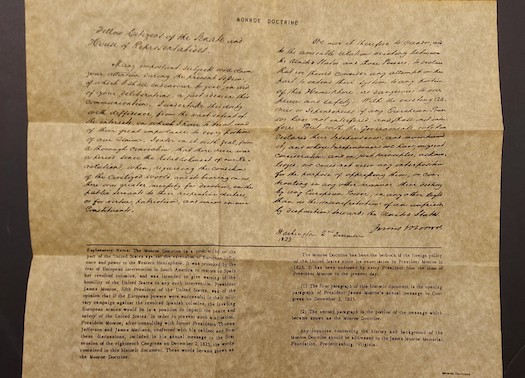
James Monroe (c. 1819) by Samuel Morse (1791-1872)
WASHINGTON, D.C., December 2, 1823 – In the greatest step to date by the United States, acting as a world power to assure the peace and security of those other nations in the Western Hemisphere which are our friendly neighbors, President Monroe today declared all of the Americas as “out of bounds” to would-be European conquerors.
A few paragraphs in a message to the newly assembled Congress, read on behalf of the President to a joint assembly of the Senate and the House of Representatives laid down a policy from which no avenue of retreat was left. In an eloquent silence after the reading, a formal motion to receive and to print the Message was adopted without debate.
One must reach back for precedent to the Pax Romana for as drastic a step taken to enclose a great portion of the world within a wall of freedom.
President Monroe declared that the United States has neither a quarrel nor a wish to interfere with or participate in any of the myriad intrigues criss-crossing the international politics of Europe. He declared further that this government accepts the status quo of all colonies or dependencies of European powers as they exist at this date in the Americas.
While President Monroe speaks as a party politician for the solidly mustered strength of the Southern States, his collaborator in framing this policy is known universally to have been John Quincy Adams, the canny New Englander and the Secretary of State. The western groupings led by Mr. Henry Clay, of Kentucky, and Genera! Andrew Jackson, of Tennessee, both bitter political enemies of President Monroe on many domestic policies, are unanimous in support of this new “doctrine.”
If one asks the questions, “Why?” – there need only be cited the great sweep of freedom’s fire through the southern half of the Western Hemisphere in the past score of years, coincident with an unholy consolidation of monarchies in Europe-Russia, Prussia, Austria, France. These monarchial governments have joined in the so-called ”Holy Alliance” for the sole purpose of defending and restoring a predatory form of self-perpetuation in Europe and whatever other reaches of the world they can redeem for their benefit.
Our immediate southern border, where we adjoin Mexico, became secure and peaceful only a year ago, when Mexico declared its freedom from Spain. Coincident with Mexican independence, Brazil, largest of the southern countries, threw off the Portuguese yoke, thereby joining Argentina, which won its freedom from Spain in 1810.
Four other major Latin countries today are struggling to coordinate their governments in freedom under the sometimes harsh but benevolent leadership of General Simon Bolivar. These are Peru, where he rules in uncontested leadership, and Venezuela, Colombia and Ecuador, where his rule is carried out by deputies.
The Spanish and Portuguese pattern of revolution is not necessarily our kind, but the freedom of these countries has been bought as dearly, and to them is just as precious as our own.
 In the wars of European powers, in matters relating to themselves, we have never taken any part, nor does it comport with our policy to do so. It is only when our rights are invaded, or seriously menaced, that we resent injuries, or make preparations for our defence. With the movements in this hemisphere, we are, of necessity, more immediately connected, and by causes, which must be obvious to all enlightened and impartial observers.
In the wars of European powers, in matters relating to themselves, we have never taken any part, nor does it comport with our policy to do so. It is only when our rights are invaded, or seriously menaced, that we resent injuries, or make preparations for our defence. With the movements in this hemisphere, we are, of necessity, more immediately connected, and by causes, which must be obvious to all enlightened and impartial observers.
The political system of the allied Powers is essentially different in this respect from that of America.
The difference proceeds from that which exists in our respective governments. And to the defence of our own, which has been achieved by the loss of much blood and treasure, and matured by the wisdom of their most enlightened citizens, and under which we have enjoyed unexampled felicity, this whole nation is devoted. We owe it, therefore, to candor and to the amicable relations existing between the United States and those Powers, to declare, that we should consider any attempt on their part to extend their system to any portion of this hemisphere, as dangerous to our peace and safety.
With the existing colonies or dependencies of any European Power, we have not interfered and shall not interfere. But, with the Governments who have declared their independence, and maintained it . . . circumstances are evidently and conspicuously different.
It is impossible that the allied Powers should extend their political systems to any portion of either (American) Continent, without endangering our peace and happiness; nor can anyone believe that our Southern brethren, if left to themselves, would adopt it of their own accord. It is equally impossible, therefore, that we should behold such interposition, in any form, with indifference.
It is still the true policy of the United States to leave all parties to themselves, in the hope that other Powers will pursue the same course.

Postlogue:
The Monroe Doctrine never was, seriously challenged, due in some measure to support by the British Government. On one later occasion Germany threatened to intervene in the affairs of Venezuela, using the security of nationals there as an excuse, but only a warning from the United States was necessary to stop this venture.

The Monroe Doctrine
